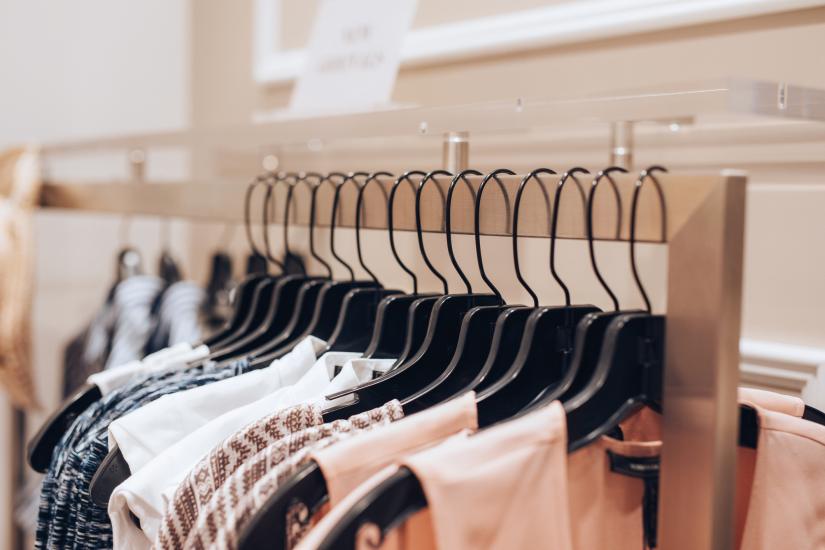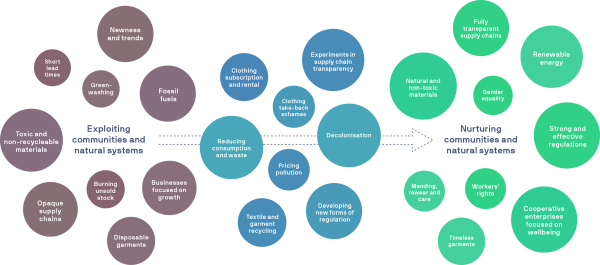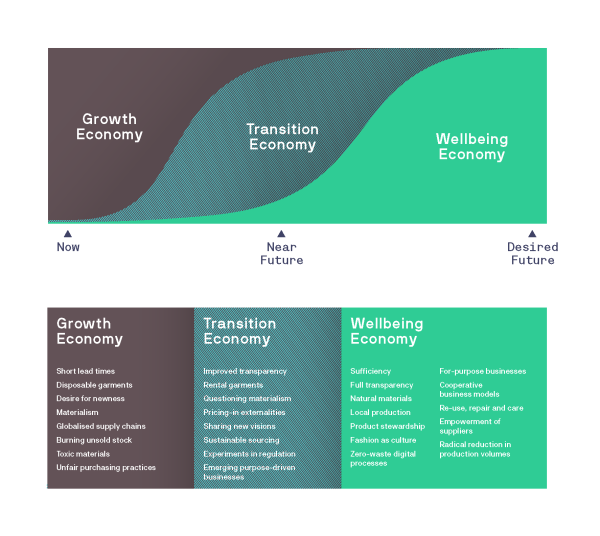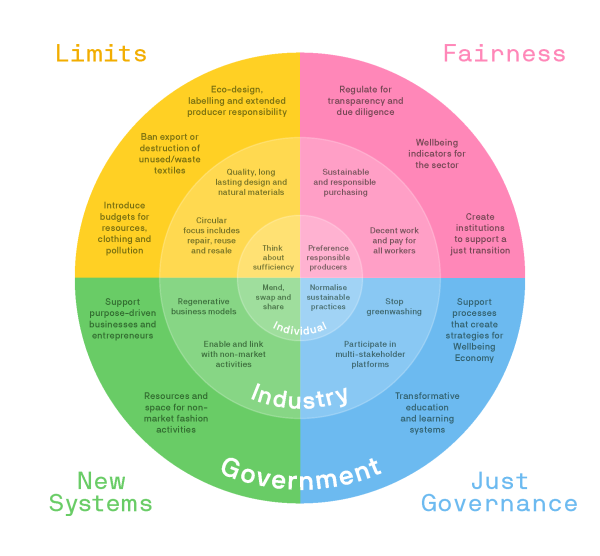The European Environmental Bureau (EEB) commissioned a team from ISF, Erasmus University Rotterdam and Lund University to develop the concept of a 'Wellbeing Wardrobe' – a fashion and textiles industry that is oriented towards a Wellbeing Economy.
The fashion and textile industry faces persistent issues of unsustainability due to environmental impacts from production and disposal, low wages and poor labour conditions. These issues have been further compounded by the advent of fast fashion, which has driven overproduction and overconsumption of textiles and garments.
In recent years, a range of sustainability strategies have been employed by the industry, including new certification and labelling systems, substitution for recycled or innovative fibres and circular economy practices (including recycling, repair and reuse). While arguably leading to some sustainability innovations and efficiency gains, many of these strategies fail to address the fundamental issues of overproduction and overconsumption at the core of the industry's sustainability crisis.
This project investigates the concept of a 'wellbeing economy' and how this can be used to guide the transformation of a fashion and textiles system that operates within planetary boundaries and provides social living standards to the many millions of people who depend on the sector for their livelihoods.
From growth economy to wellbeing economy
Conventional measures of the health of a nation’s economy – such as GDP (Gross Domestic Product), employment rates and inflation – focus only on growth. Yet there is substantial evidence that economies and societies based on growth and consumption have not led to increased levels of human happiness or wellbeing.
A wellbeing economy revolves around a planned reduction of energy and resource use to bring economic activity back into alignment with environmental health and human wellbeing.
Transitioning to a post-growth textiles and garment sector will require wide-ranging reforms and a broad reconceptualisation of roles and responsibilities. Taking into account the scale of the transformation required, the report maps the transition in three stages: from our current state, to the desired wellbeing economy. The diagram below shows this proposed process, noting both grassroots and top-down approaches to reducing unsustainable activities and scaling up activities that contribute to achieving wellbeing.
Principles for a wellbeing economy
This research identifies four guiding principles for a sustainable and thriving fashion and textile sector and gives examples of how stakeholders – including individual consumers of fashion and textiles – can follow them.
They are:
- establish limits: a wellbeing economy approach sets limits on resource use and consumption and shows people how they can still live well while respecting these boundaries
- promote fairness: equitable wealth distribution systems are needed to ensure global and intergenerational fairness
- create healthy and just governance: robust participatory and deliberative processes that emphasise inclusivity, open dialogue and diversity are key to creating lasting change
- embrace new exchange systems: innovative exchange models can ensure the fashion industry thrives while still meeting human and environmental wellbeing needs by providing dignified work, regenerating the environment, and strengthening community bonds.
Impact
This research provides evidence that will inform policy around a growth-independent fashion sector, and recommendations that will support change within the emerging EU textile policy mix.
RESEARCH OUTPUTS
Wellbeing Wardrobe: A wellbeing economy for the fashion and textile sector (2022) (Report)
Wellbeing Wardrobe: A wellbeing economy for the fashion and textile sector (2022) (Summary)
MEDIA
Wellbeing Wardrobe Podcast (Acast, Spotify, Apple Podcast) - European Environnemental Bureau, January 2023
To make our wardrobes sustainable, we must cut how many new clothes we buy by 75% - The Conversation, April 2022 (written by the report authors)
To make our wardrobes sustainable, we must cut how many new clothes we buy by 75% - The Guardian, April 2022
How to make your wardrobes sustainable - The Economic Times, April 2022
How the seven-time rule is destroying vintage fashion - The Sydney Morning Herald, April 2022
How sustainable is your wardrobe? - 2Ser 107.3 Radio, April 2022
How can we meet global climate targets when the fashion industry is so far behind? - Junkee, May 2022
How A Wellbeing Economy for Fashion Can Put People & Planet Above Profits - Conscious Life & Style, July 2022
Researchers
-
Associate Professor and Research Director
-
Research Director
-
Research Principal
-
Research Principal
Year
2021-2022
Location
Global
Client
European Environmental Bureau
Partners
Erasmus University Rotterdam
Lund University












